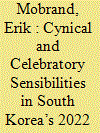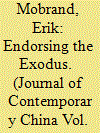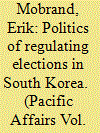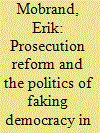| Srl | Item |
| 1 |
ID:
185525


|
|
|
|
|
| Summary/Abstract |
Why was South Korea’s 2022 presidential election so close, when only a few years prior the party of the winning candidate had been out of contention? The answer can be found by situating the election against a battle between democratic and anti-democratic forces. Anti-democratic forces cynically bid for power by denigrating politics. An examination of how this cynical sensibility developed, from 2016 to 2022, but on the back of a deeper history, points both to what was at stake in this election and to the methods deployed by representatives of the anti-democratic forces that helped create parity in the vote.
|
|
|
|
|
|
|
|
|
|
|
|
|
|
|
|
| 2 |
ID:
085969


|
|
|
|
|
| Publication |
2009.
|
| Summary/Abstract |
Discussions of migration in contemporary China often center on the distinctive institutions, especially household registration (hukou) regulations, which continue to limit the options of rural people in cities. This paper draws attention to how another part of the Chinese state has engaged migration: governments in communities of origin. Evidence from Sichuan in the 1980s reveals that local leaders authorized, facilitated, and even organized out-migration of villagers, at a time when Beijing gave scant indication of official approval of peasant migration. Local innovations to sanction migration built directly on the broader trend of rural cadres becoming increasingly responsive to local economic needs. The story of local government involvement in out-migration indicates that the relationship between migrants and the Chinese state has transformed fundamentally, even though formal institutions governing urban residence have changed minimally. As in other fields of social and economic life in China, authority over migration has fragmented.
|
|
|
|
|
|
|
|
|
|
|
|
|
|
|
|
| 3 |
ID:
142070


|
|
|
|
|
| Summary/Abstract |
Establishing an effective legal framework for regulating elections is widely considered a priority for new democracies. Electoral regulation, though, can be profoundly political. I examine the politics of electoral regulation in South Korea. The country’s restrictive campaign laws stand in sharp contrast to the liberal values that many espouse. Given the vibrancy of South Korea’s civil society and the entrance of many former activists into party politics, it is surprising that laws continue to limit political discussion and participation during election campaigns. I shed light on this puzzle by examining the ways an established party elite appropriated predemocratic institutions of electoral governance. Restrictive election regulations have their origins decades before South Korea’s democratic transition began in 1987. I offer evidence from the evolution of campaign laws in order to demonstrate continuity in important portions of the restrictions and to suggest reasons why a group of influential actors have converged around the perpetuation of these restrictions. This study has implications for the subject of electoral engineering and for thinking about South Korea’s democratization
|
|
|
|
|
|
|
|
|
|
|
|
|
|
|
|
| 4 |
ID:
178405


|
|
|
|
|
| Summary/Abstract |
A public struggle in South Korea around prosecution reform brings into focus a deeper battle between forces seeking to make the state more responsive to ordinary people and those aiming to preserve the status quo. Opponents of prosecution reform turned to a mode of politics that appropriated the styles and symbols of democracy to justify the obstruction of reforms that would break down a key authoritarian legacy and source of entrenched privilege. They deployed multiple methods of “faking” democracy: assuming the mantle of anti-corruption champions, drawing on tropes from the anti-authoritarian opposition of the past, and normalizing marginal views. The politics of prosecution reform illuminates the mass struggle that defines South Korea’s democracy and also points to a dangerous and subtle mode of politics that is increasingly visible around the world yet under-appreciated in most approaches to thinking about democracy.
|
|
|
|
|
|
|
|
|
|
|
|
|
|
|
|
| 5 |
ID:
144229


|
|
|
|
|
| Summary/Abstract |
In the decade and a half following Korean liberation from Japan in 1945, a category of men prowled Seoul's back alleys and also its halls of power. These figures might be called street leaders, for they were directly linked on one hand to private agents of violence and on the other to the top state and political elites of the country. The most notorious individuals included Kim Tu-han, a gang leader who became an elected politician, and Yi Chŏng-jae, a ‘political gangster’ who helped party politicians with their dirty work. Street leaders like Kim and Yi were on the scene at key moments in the republic's early political development. An examination of the political careers of Kim and Yi reveals how important cooperation between such actors and elite politicians was to state-building, political mobilization, and design of electoral institutions—processes that created the contemporary South Korean polity. Both the alliances between politicians and street leaders as well as the destruction of those alliances left deep impressions on South Korean politics.
|
|
|
|
|
|
|
|
|
|
|
|
|
|
|
|